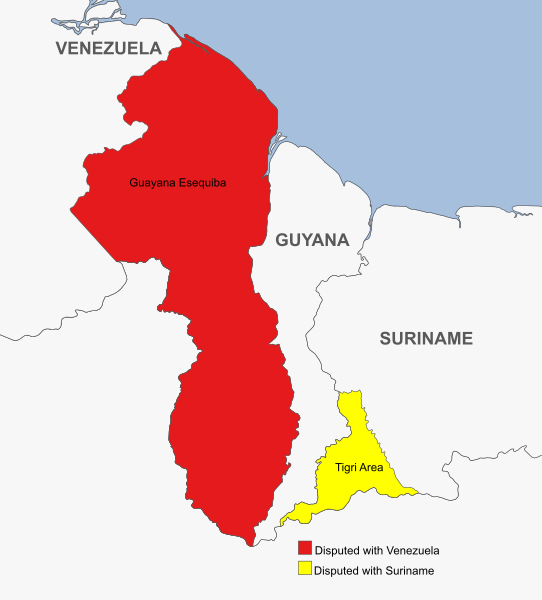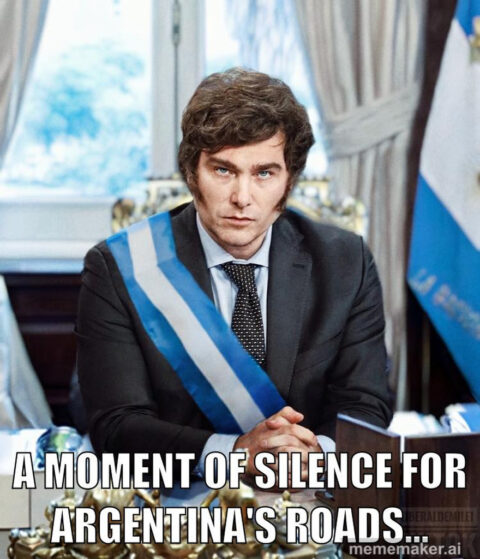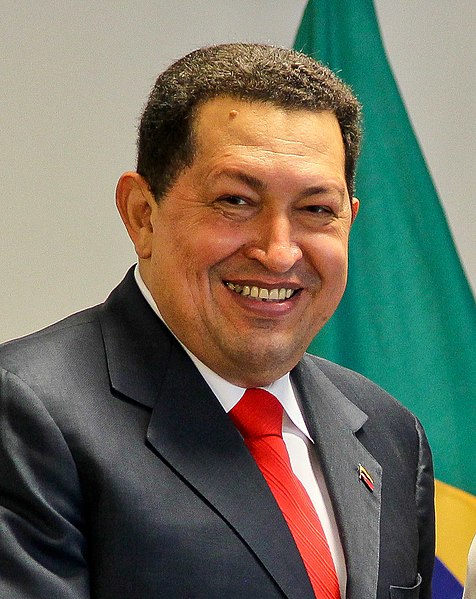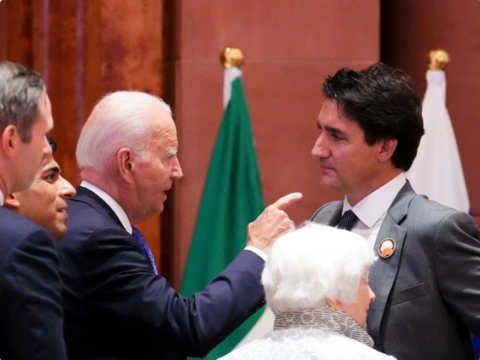All dictators get their start by discovering some loophole in the democratic process. Xi realized that control of corruption investigations let him imprison anyone he wanted. Erdogan realized that EU accession talks provided the perfect cover to retool Turkish institutions in his own image.
Hugo Chavez realized that there’s no technical limit on how often you can invoke the emergency broadcast system. You can do it every day! The “emergency” can be that you had a cool new thought about the true meaning of socialism. Or that you’re opening a new hospital and it makes a good photo op. Or that opposition media is saying something mean about you, and you’d like to prevent anyone from watching that particular channel (which is conveniently bound by law to air emergency broadcasts whenever they occur).
This might not be the only reason or even the main reason Hugo Chavez ended up as dictator. But it’s a very representative reason. If Putin is basically a spook and Modi is basically an ascetic, Hugo Chavez was basically a showman. He could keep everyone’s attention on him all the time (the emergency broadcast system didn’t hurt). And once their attention was on him, he could delight them, enrage them, or at least keep them engaged. And he never stopped. Hugo Chavez was the marathon runner of dictators.
He was on television almost every day for hours at a time, invariably live, with no script or teleprompter, mulling, musing, deciding, ordering. His word was de facto law, and he specialised in unpredictable announcements: nationalisations, referenda, troop mobilizations, cabinet shuffles. You watched not just for news value. The man was a consummate performer. He would sing, dance, rap; ride a horse, a tank, a bicycle; aim a rifle, cradle a child, scowl, blow kisses; act the fool, the statesman, the patriarch. There was a freewheeling, improvised air to it all. Suspense came from not knowing what would happen.
There would be no warning. Soap operas, films, and baseball games would dissolve and be replaced by the familiar face seated behind a desk or maybe the wheel of a tractor … it could [last] minutes or hours. Sometimes Chavez wouldn’t be talking, merely attending a ceremony … One time Chavez decided to personally operate a machine on the Caracas-to-Charallave rail tunnel. A television and radio announcer improvised commentary for the first few minutes, but gradually ran out of things to say as the president continued drilling, drilling, drilling. Radio listeners, blind to Chavez pounding away, were baffled and then alarmed by the mechanical roar monopolizing the airwaves. Some thought it signaled a coup.
In 2012, while he was dying of cancer, Chavez gave “a state of the nation address lasting nine and a half hours. A record. No break, no pause.” Put a TV camera in front of him, and the man was a machine.
If he had been an ordinary celebrity, he would be remembered as a legend. But he went too far. He became his TV show. He optimized national policy for ratings. The book goes into detail on one broadcast in particular, where he was filmed walking down Venezuela’s central square, talking to friends. He remarked on how the square needed more monuments to glorious heroes. But where could he put them? The camera shifted to a mall selling luxury goods. A lightbulb went on over the dictator’s head: they could expropriate the property of the rich capitalist elites who owned the mall, and build the monument there. Make it so! Had this been planned, or was it really a momentary whim? Nobody knew.
Then he would move on to some other topic. An ordinary citizen would call in and describe a problem. Chavez would be outraged, and immediately declare a law which solved that problem in the most extreme possible way. Was this staged? Was it a law he had been considering anyway? Again, hard to tell.
Sometimes everyone in government would ignore his decisions to see if he forgot about them. Sometimes he did. Other times he didn’t, and would demand they be implemented immediately. Nobody ever had a followup plan. They expropriated the mall, but Chavez’s train of thought had already moved on, and nobody had budgeted for the glorious monuments he had promised. The mall sat empty; it became a dilapidated eyesore. Laws declared on the spur of the moment to sound maximally sympathetic to one person’s specific problem do not, when combined into a legal system, form a great basis for governing a country.
But Chavez TV was also a game show. The contestants were government ministers. The prize was not getting fired. Offenses included speaking out against Chavez:
Chavez clashed with and fired all his ministers at one time or another but forgave and reinstated his favorites. Nine finance ministers fell in succession … it was palace custom not to give reasons for axing. Chavez, or his private secretary, would phone the marked one to say thank you but your services are no longer required. Good-bye. The victim was left guessing. Did someone whisper to the comandante? Who? Richard Canan, a young, rising commerce minister, was fired after telling an internal party meeting that the government was not building enough houses. Ramon Carrizales was fired as vice president after privately complaining about Cuban influence. Whatever the cause, once the axe fell, expulsion was immediate. The shock was disorienting. Ministers who used to bark commands and barge through doors seemed to physically shrink after being ousted … they haunted former colleagues at their homes, seeking advice and solace, petitioning for a way back to the palace. “Amigo, can you have a word with the chief?” One minister, one of Chavez’s favorites, laughed when he recounted this pitiful lobbying. “They know it as well as I do. In [this government] there are no amigos.”
… or taking any independent action:
[A minister] was not supposed to suggest an initiative, solve a problem, announce good news, theorise about the revolution, or express an original opinion. These were tasks for the comandante. His fickleness encouraged ministers to defer implementation until they were certain of his wishes. In any case they spent so much time on stages applauding — it was unwise to skip protocol events — that there was little opportunity for initiative. Thus the oil minister Rafael Ramirez would lurk, barely visible, while the comandante signed a lucrative deal with Chevron […]
But upon command, the stone would transform into a whirling dervish … the comandante‘s impulsiveness demanded instant, urgent responses. He would become consumed by a theme. Rice! Increase rice production! The order would ricochet through [the government]. The agriculture, planning, transport, commerce, finance, and infrastructure ministers would work around the clock devising a scheme or credits, loans, cooperatives, mills and trucks to have it ready, at least on paper, for the comandante to unveil on his Sunday show. Thus was born the Mixed Company for Socialist Rice. Then, the next week, chicken! Cheaper chicken! The same ministers would forget about rice while they rushed to squeeze farmers, truckers, and supermarkets so that the comandante could say, on his next show, that chicken was cheaper.
… or, worst of all, not enjoying Chavez’s TV shows enough:
[Ministers had to] arrange their features into appropriate expressions when on camera or in the comandante‘s sight line. This was tricky when the comandante did something foolish or bizarre because the required response could contradict instinct … Missing a cue could be fatal. During a show the comandante‘s laser-beam gaze swung from face to face, spotlighting expressions, seeking telltale tics. Immediately after a broadcast, Chavez reviewed the footage, casting a professional eye over the staging, lighting, camera angles — and audience reaction.
The comandante‘s occasional lapses into ridiculous were inevitable. He spoke up to nine hours at a time live on television, without a script … Being capricious and clownish also sustained interest in the show and underlined his authority. No other government figure, after all, dared show humour in public. But on occasion this dissolved into absurdity. Who tells a king he is being a fool?
Ministers faced another test of the mask in September 2007, when the comandante announced clocks would go back half an hour. The aim was to let children and workers wake up in daylight, he said. “I don’t care if they call me crazy, the new time will go ahead, let them call me whatever they want. I’m not to blame. I received a recommendation and said I liked the idea.” Chavez wanted it implemented within a week — causing needless chaos — and bungled the explanation, saying clocks should go forward rather than back. If ministers realized the mistake, they said nothing, only smiled and clapped […]
On rare occasions the correct response was not obvious, sowing panic. In a speech to mark World Water Day in 2011, the comandante said capitalism may have killed life on Mars. “I have always said, heard, that it would not be strange that there had been civilisation on Mars, but maybe capitalism arrived there, imperialism arrived and finished off the planet.” Some in the audience tittered, assuming it was a joke, then froze when they saw neighbors turned to stone. To these audience veterans it was unclear if it was a joke, so they adopted poker faces, pending clarification. It never came; the comandante moved on to other topics.
How did a once-great nation reach this point? I read Rory Carroll’s Comandante to find out.





 DISCLAIMER
DISCLAIMER










